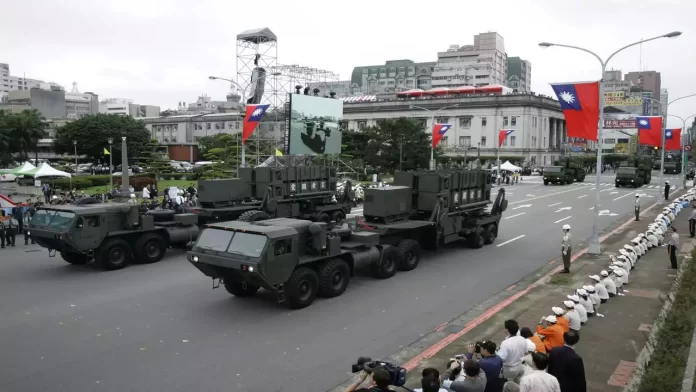The U.S. State Department has approved the potential sale of military technical assistance to Taiwan worth an estimated $108 million, the Pentagon said on Friday.
Despite Beijing’s warnings, the US State Department has approved the potential sale of military-technical assistance to Taiwan worth an estimated $108 million, the Pentagon said on Friday.
In order to increase pressure against China, the United States, in recent years, has carried out provocative actions such as arms sales and maritime patrols, as well as taking advantage of existing territorial disputes in the South East China Seas.
The United States says it has unofficial relations with Taiwan, however, it has repeatedly provided military aid to the island, and US President Joe Biden’s administration has vowed to step up engagement with the island.
Pentagon says Taiwan requested the latest assistance, including spare and repair parts for tanks and combat vehicles, and US government and contractor technical and logistical support, Reuters reported.
“The proposed sale will contribute to the sustainment of the recipient’s vehicles, small arms, combat weapon systems, and logistical support items, enhancing its ability to meet current and future threats,” the Pentagon’s Defense Security Cooperation Agency said in a statement.
Such provocative actions of the US come as China’s Ministry of Defense has announced that the country maintains its full combat readiness to stop the efforts of foreign forces to achieve the so-called independence of Taiwan.
According to a report, The United States has only unofficial relations with Taipei. But U.S. law requires Washington to provide Taiwan with the means to defend itself, and President Joe Biden’s administration has vowed to step up engagement with the island.
The U.S. State Department has approved the potential sale of military technical assistance to Taiwan worth an estimated $108 million, the Pentagon said on Friday.
China has never renounced the use of force to bring Taiwan under its control, and the democratically governed island has complained of increased military pressure from Beijing to try and force it to accept its sovereignty.
The United States has only unofficial relations with Taipei. But U.S. law requires Washington to provide Taiwan with the means to defend itself, and President Joe Biden’s administration has vowed to step up engagement with the island.
Taiwan requested the latest assistance, including spare and repair parts for tanks and combat vehicles, and U.S. government and contractor technical and logistical support, the Pentagon said.
“The proposed sale will contribute to the sustainment of the recipient’s vehicles, small arms, combat weapon systems, and logistical support items, enhancing its ability to meet current and future threats,” the Pentagon’s Defense Security Cooperation Agency said in a statement.
It would also enhance Taiwan’s military interoperability with the United States and other allies, and the island’s armed forces would have no difficulty absorbing the equipment and support, it added.
The State Department notification does not indicate that a contract has been signed or that negotiations have concluded. However, Taiwan’s Defense Ministry said the deal was expected to “become effective” within a month.
“In the face of the expanding military threat of the Chinese Communists, properly maintaining equipment is as important as newly purchased weapons and equipment,” it added in a statement.
Successive U.S. administrations have urged Taiwan to modernize its military to become a “porcupine” that is hard for China to attack, advocating the sale of inexpensive, mobile, and survivable – or “asymmetric” – weapons that could outlast any initial assault by China’s larger military.
READ ALSO: US-Saudi ties: Biden meets with Saudi’s MBS, raises killing of journalist Khashoggi
Some U.S. business groups, however, have criticized the Biden administration’s Taiwan arms sales policy, arguing it is too restrictive and fails to address challenges posed by China’s military.
U.S.-Taiwan Business Council President Rupert Hammond-Chambers welcomed the announcement in a statement, but said it was a sign the administration was focused on sustainment and munitions support for Taiwan, and that force modernization of its military “is no longer a priority.”
The amendment was authored and introduced by Indian-American Congressman Ro Khanna.
If the Joe Biden administration decides to consider India’s case for a waiver, the US Senate will have to discuss it and take it up for voting. Once that is done, the President will sign it into law and, in between, there are several procedural issues that have to be addressed.
Caatsa provides for punitive actions against countries engaged in transactions with Russian defence and intelligence sectors.
On the possibility of being sanctioned for its S-400 deal with Russia, the Ministry of External Affairs has reiterated that India follows an independent foreign policy and its defence acquisitions are guided by national security interests.
Khanna said the move will further strengthen the US-India defence partnership. “There is no relationship of greater significance to US strategic interests than the US-India partnership. My bipartisan NDAA amendment marks the most significant piece of legislation for US-India relations out of Congress since the US-India nuclear deal,” he said.
“The United States must stand with India in the face of escalating aggression from China. As vice chair of the India Caucus, I have been working to strengthen the partnership between our countries,” said Khanna.













